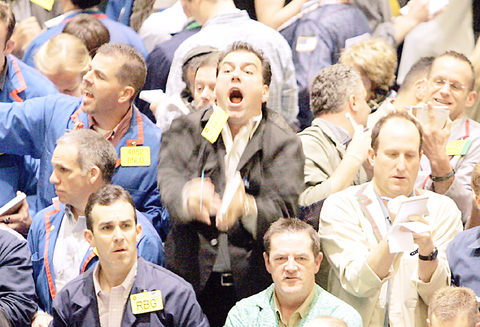World oil prices rose on Friday as the hospitalization of Saudi King Fahd unsettled markets already skittish about demand at the start of the US summer driving season.
New York's main contract, light sweet crude for delivery in July, climbed US$0.84 to US$51.85 per barrel in closing deals.
In London, the price of Brent North Sea crude oil for delivery in July gained US$0.54 to US$50.70 per barrel.

PHOTO: AP
King Fahd's hospitalization left markets nervous about events in the world's largest oil producer, which has pledged to boost production to meet surging global demand.
"Prices rose rose on short covering ahead of the week-end but then came the news that King Fahd had been brought to a hospital," which accelerated the buying, said Fimat USA analyst John Kilduff.
If Fahd were to die over the weekend, that would likely boost prices because of the "uncertainty in the major oil producer in the Middle East," he added.
Seth Kleinman of PFC Energy said the news from Saudi Arabia had an impact but "we had a strong week" for oil prices as a disappointing report on US stockpiles prompted buyers to bid up prices.
"The fundamentals have changed a lot," he said.
Prices had closed more than a dollar higher on Wednesday when a US government survey showed a surprise drop in inventory levels of crude oil, which refineries turn into gasoline.
The US summer holiday driving season, which sees many Americans taking to the open roads in their vehicles, officially begins this weekend ahead of the Memorial Day holiday.
"Some of the gains seen this week have also been in preparation for the long weekend," Investec analyst Bruce Evers said.
The US Energy Department said Wednesday that US crude inventories fell 1.6 million barrels in the latest week, against market expectations for an increase.
But at 332.4 million barrels, stocks remained well above the upper end of the average range for this time of year.
The report also showed gasoline stockpiles rising 600,000 barrels to 215.4 million, in line with most forecasts.
"With the product inventories still bearish the market may struggle to break any higher unless we see some bullish fundamental news," analysts at the Sucden brokerage firm said.
"Crude stocks are still over 10 percent above year-ago levels and OPEC looks likely to continue almost flat-out crude production."
The Organization of Petroleum Exporting Countries is producing in excess of 30 million barrels per day, a figure that is close to 25-year high points.
Tetsu Emori, chief commodities strategist at Mitsui Bussan Futures in Tokyo, said US gasoline stockpile levels were stable, allowing prices to ease below US$50 per barrel next week.
"I think there's a possibility of prices going down rather than going up," he said. "I don't think the gasoline market is tight, it's stable," he said, adding that US refineries were capable of meeting demand during the summer driving season.

KEEPING UP: The acquisition of a cleanroom in Taiwan would enable Micron to increase production in a market where demand continues to outpace supply, a Micron official said Micron Technology Inc has signed a letter of intent to buy a fabrication site in Taiwan from Powerchip Semiconductor Manufacturing Corp (力積電) for US$1.8 billion to expand its production of memory chips. Micron would take control of the P5 site in Miaoli County’s Tongluo Township (銅鑼) and plans to ramp up DRAM production in phases after the transaction closes in the second quarter, the company said in a statement on Saturday. The acquisition includes an existing 12 inch fab cleanroom of 27,871m2 and would further position Micron to address growing global demand for memory solutions, the company said. Micron expects the transaction to

Nvidia Corp’s GB300 platform is expected to account for 70 to 80 percent of global artificial intelligence (AI) server rack shipments this year, while adoption of its next-generation Vera Rubin 200 platform is to gradually gain momentum after the third quarter of the year, TrendForce Corp (集邦科技) said. Servers based on Nvidia’s GB300 chips entered mass production last quarter and they are expected to become the mainstay models for Taiwanese server manufacturers this year, Trendforce analyst Frank Kung (龔明德) said in an interview. This year is expected to be a breakout year for AI servers based on a variety of chips, as

Global semiconductor stocks advanced yesterday, as comments by Nvidia Corp chief executive officer Jensen Huang (黃仁勳) at Davos, Switzerland, helped reinforce investor enthusiasm for artificial intelligence (AI). Samsung Electronics Co gained as much as 5 percent to an all-time high, helping drive South Korea’s benchmark KOSPI above 5,000 for the first time. That came after the Philadelphia Semiconductor Index rose more than 3 percent to a fresh record on Wednesday, with a boost from Nvidia. The gains came amid broad risk-on trade after US President Donald Trump withdrew his threat of tariffs on some European nations over backing for Greenland. Huang further

HSBC Bank Taiwan Ltd (匯豐台灣商銀) and the Taiwan High Prosecutors Office recently signed a memorandum of understanding (MOU) to enhance cooperation on the suspicious transaction analysis mechanism. This landmark agreement makes HSBC the first foreign bank in Taiwan to establish such a partnership with the High Prosecutors Office, underscoring its commitment to active anti-fraud initiatives, financial inclusion, and the “Treating Customers Fairly” principle. Through this deep public-private collaboration, both parties aim to co-create a secure financial ecosystem via early warning detection and precise fraud prevention technologies. At the signing ceremony, HSBC Taiwan CEO and head of banking Adam Chen (陳志堅)